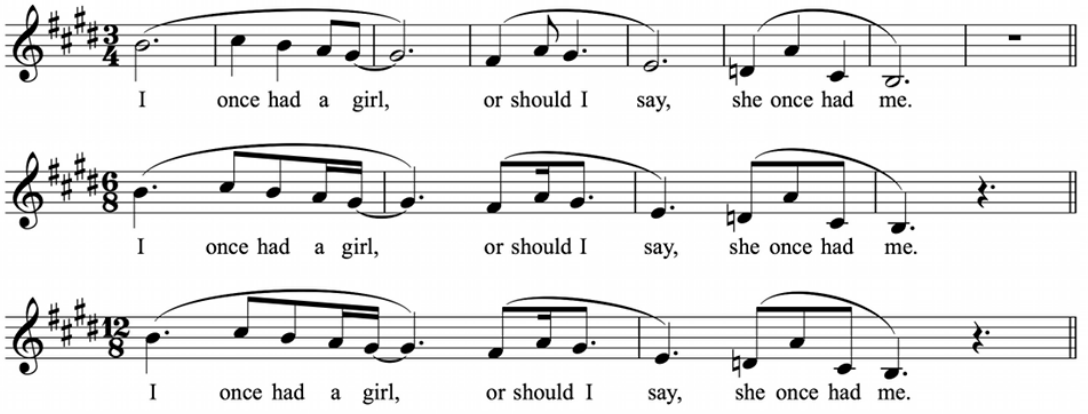|
Trevor de Clercq, Assistant Professor in the Recording Industry faculty at Middle Tennessee State University, authored an article titled "Measuring a Measure: Absolute Time as a Factor in Determining Bar Lengths and Meter in Pop/Rock Music" in 2016. This blog is a summary and critique of that article. The article opens with three different transcriptions of The Beatles' 1966 'Norwegian Wood (This Bird Has Flown)'. To be clear, they are all correct, even thought they all employ different time signatures. Had The Beatles written down their songs as sheet music, we could use whatever meter that sheet music used as the definitive interpretations. However, with no such "official score" available, de Clercq ponders, "Is one of these time signatures more appropriate than the others?" And to answer that question, he posits "that absolute time plays a significant role in determining our perception of meter". He further suggests that "about two seconds" is the best ballpark absolute duration per measure. In other words, if you have to chose between multiple valid options for an ambiguous meter, your default interpretation should be that which is closest to two seconds, which he considers the Goldilocks zone: not too short, not too long, but just right. Applying that principle to 'Norwegian Wood', the best choice would be 6/8, which, at 60 bpm, yields precisely two seconds per measure. Having objectively summarized de Clercq's main point (the "two second rule"), I'll now subjectively critique the essay. To do so, I will distinguish between the content of the article and the presentation of that content.
The content - mainly that two seconds per measure should be the default duration when transcribing rock music - I find valid and compelling. I will certainly adopt this "two second rule" whenever I'm analyzing pop music in the future. That being said, I find the same problem I often encounter in academic essays in the presentation - mainly that it's too long and too complicated. I'm a firm proponent of the "less is more" writing philosophy - that authors should write only enough to effectively articulate their meaning because writing any more than that is superfluous! But the academic approach to writing, as witnessed in this essay, seems to be "why write three pages when you could write forty pages saying the same thing?" This is overly-formal, meaning it's formal to the point of inhibiting understanding. And as professional educators, aren't academics supposed to facilitate learning, rather than impede it? I'm guessing that de Clercq would counter my criticism by saying he wants to be as thorough as possible, and that's why he included 19 pages of examples. And of course he needs to be thorough, and he certainly needs to demonstrate that thoroughness. Yet he could've written an economical four page article (instead of fourteen) with a substantial appendix that would both exhibit his meticulous research and analysis while also "tightening up" the essay by omitting the nonessential material. Though I regard the content of this article highly, I find the presentation problematic. In short, the content, while valuable, is not substantial enough to justify the verbose presentation. And so I return, once again, to "less is more": A more concise delivery would only make this essay better.
0 Comments
Leave a Reply. |
Aaron Krerowicz, pop music scholarAn informal but highly analytic study of popular music. Archives
August 2019
Categories
All
|

 RSS Feed
RSS Feed
